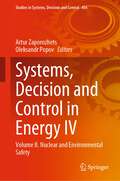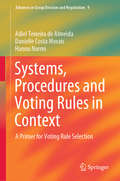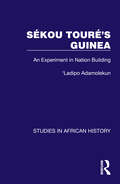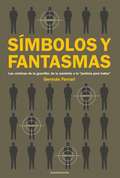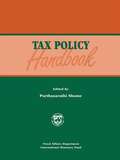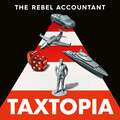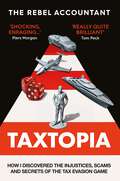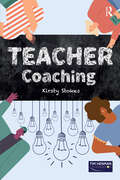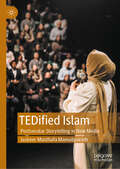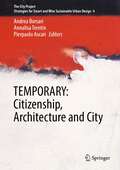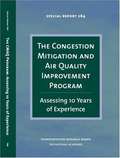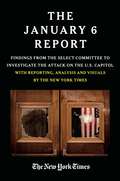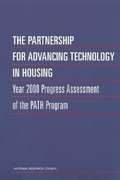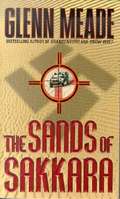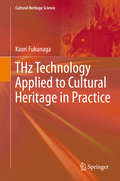- Table View
- List View
Systems, Decision and Control in Energy IV: Volume IІ. Nuclear and Environmental Safety (Studies in Systems, Decision and Control #456)
by Artur Zaporozhets Oleksandr PopovIn recent years, the scale of environmental hazards has been growing, emergencies occur more often at special facilities, in particular nuclear power, the largest of which was the accident at the Chernobyl nuclear power plant in Ukraine on April 26, 1986. With the advent of nuclear power, it was believed that nuclear power reactors were safe enough, control and monitoring systems, protective screens and trained personnel would guarantee their trouble-free operation. There is also a trend now that nuclear power is "environmentally friendly" because it provides a reduction in greenhouse gas emissions with replacing power plants working on fossil fuels. Some countries, such as the United States, have recently classified nuclear energy as a renewable energy source. Despite this, nuclear power is potentially dangerous due to: - possible accidents at power plants, accompanied by the ejection of radioactive materials into the environment; - ejections of about 250 radioactive isotopes into the environment as a result of the operation of nuclear reactors; - emissions of 85Kr, which changes the electrical conductivity of the atmosphere. This gas behaves like a greenhouse gas in the atmosphere, thereby contributing to anthropogenic climate change on Earth; - pollution of the biosphere with plutonium; - radioactive waste is the most important cause of environmental hazard, which remains unresolved. Civilian nuclear power reactors operating throughout the world annually generate large amounts of low-, medium- and high-level radioactive waste. Radioactive pollution accompanies all parts of the complex production of nuclear energy: the extraction and processing of uranium, the operation of nuclear power plants, the storage and regeneration of fuel, which has a significant impact on the environmental friendliness of nuclear energy. In addition, up to 300 natural and technogenic emergencies are registered annually, as a result of which people die and great economic damage is caused. The main reasons for the occurrence of technogenic accidents and catastrophes and the strengthening of the negative impact due to the occurrence of natural and technogenic emergencies in Ukraine are: obsolete fixed assets, in particular for environmental purposes; large volume of transportation, storage and use of hazardous substances; the emergency state of a significant part of public utility networks; insufficient investment support for the process of introducing the latest resource-saving and environmentally friendly technologies in environmentally hazardous industries, primarily in the metallurgical, chemical, petrochemical and energy sectors; environmental problems associated with significant changes in the state of the geological and hydrogeological environment and caused by the closure of unprofitable mining enterprises and mines; unwillingness of economic subjects to take measures to prevent accidents and catastrophes at high-risk and potentially hazardous facilities.
Systems, Procedures and Voting Rules in Context: A Primer for Voting Rule Selection (Advances in Group Decision and Negotiation #9)
by Hannu Nurmi Danielle Costa Morais Adiel Teixeira de AlmeidaThis book deals with the choice of methods to be applied in the decision processes within organizations. It discusses the use of voting procedures for group decision in business organizations, focusing on decision-making contexts. Within this book the reader explores the relevant part of the decision-making process consisting of choosing the voting procedures and recognizing the drawbacks of that procedure. This book includes a unique feature of providing a framework for choosing the voting procedure that is the most appropriate for a particular business decision process. The book is useful for a broad researcher audience dealing with the group decision making processes within business organizations and for practitioners and students working in the group decision and negotiation field.
Sámi Educational History in a Comparative International Perspective
by Merja Paksuniemi Otso Kortekangas Pigga Keskitalo Jukka Nyyssönen Andrej Kotljarchuk David SjögrenThis book provides a comprehensive overview of Sámi education in a historical and internationally comparative perspective. Despite the cross-national character of the Sámi population, academic literature on Sámi education has so far been published within the different nation states in the Sámi area, and rarely in English. Exploring indigenous educational history around the world, this collection spans from Asia to Oceania to Sápmi and the Americas. The chapters frame Sámi school history within an international context of indigenous and minority education. In doing so, two narrative threads are established: both traditional history of education, and perspectives on the decolonisation of education. This pioneering book will appeal to students and scholars of Sámi education, as well as indigenous education around the world.
Sékou Touré’s Guinea: An Experiment in Nation Building
by Ladipo AdamolekunOriginally published in 1976, this book was the first comprehensive analysis in English of the post-independence developments in the West African Republic of Guinea. It is a scholarly analysis of the different aspects of life in the country: political, economic and social. Among other things, the significance and consequences of the 1958 historic vote for independence are carefully examined: the role of President Touré, the country’s first and only Head of State, is assessed; the role of one of Africa’s earliest single mass parties, the Democratic Party of Guinea is also discussed, and the abortive invasion of November 1970 is situated in its correct historical perspective. This carefully researched book was based on observation and interviews, and on published and unpublished government and party documents, most of which were only available inside Guinea.
Sí se puede: Crónica de un cambio
by Fernando Canales ClariondAnálisis crítico de una época de cambio crucial en la política mexicana. Desde su óptica, el autor describe en este libro la transición a la democracia en Nuevo León y en México, en el contexto de los acontecimientos internacionales y nacionales, así como los factores históricos y sociológicos que influyeron en los procesos políticos. Como protagonista de estos episodios en la historia de México, comparte su experiencia en la conformación de los primeros gobiernos emanados del PAN en el estado de Nuevo León y en el Gobierno Federal. Describe los logros y las dificultades que se vivieron, analiza las causas y apunta sugerencias y alternativas creativas de solución a uno de los problemas endémicos de México: la falta de unidad y de confianza. Crítica objetiva, análisis de aciertos, análisis de errores, anecdotario histórico-político, posturas categóricas y propuestas de cambio. Eso y más encontrará el lector en Sí se puede. Crónica de un cambio.
Símbolos y fantasmas: Las víctimas de la guerrilla: de la amnistía a la "justicia para todos"
by Germán FerrariA través de testimonios, archivos periodísticos y documentos judiciales,el autor bucea en el resurgimiento de la denominada «teoría de los dosdemonios», a partir de la reapertura de los juicios a represores de laúltima dictadura militar y analiza la estrategia desplegada por diversossectores del centro a la derecha para calificar como «crímenes de lesahumanidad» a los atentados de la guerrilla. ¿Por qué la evocación en torno de las víctimas de la guerrilla implicasiempre de manera explícita o velada una reivindicación de la últimadictadura militar? Partiendo de cuatro casos emblemáticos de víctimasatribuidas a la guerrilla -Argentino del Valle Larrabure, Pedro EugenioAramburu, Jordán Bruno Genta y José Ignacio Rucci-, Germán Ferrariindaga en las relaciones entre estos personajes y la aparición de unnuevo discurso que equipara el terrorismo de Estado con las acciones delas organizaciones milicianas.Los casos elegidos reúnen todos los elementos necesarios para ensayaruna respuesta a ese interrogante crucial ante la construcción de unfuturo sin lastres de autoritarismo. Fueron símbolos para la últimadictadura y son fantasmas que aún acosan a esta democracia imperfecta.«Símbolos y fantasmas» demuestra cómo detrás del lema «justicia paratodos» se oculta una realidad más compleja, en la que se mezclan eldolor y el oportunismo político.
S’intégrer pour s’enrichir
by Elias T. Ayuk Samuel T. KaboréL'intégration régionale comme premier pas vers l'accès au marché mondial? Dans un contexte où la libéralisation du commerce n'a pas entraîné les gains escomptés par les pays sous-développés et où la croissance du commerce mondial ne s'est pas accompagnée d'une croissance économique équivalente, une solution alternative a émergée. Un nouveau paradigme a fait valoir que la libéralisation des échanges devait s'accompagner d'investissements publics. Cela dit, la nature même de la libéralisation du commerce entraîne une diminution des ressources nécessaires aux investissements publics. Sur la base d'arguments solides, les pays sous-développés sont donc actuellement encouragés à mettre d'abord l'accent sur l'intégration régionale avant de rechercher l'accès au marché mondial. Cet ouvrage, qui aborde les questions liées à l'intégration régionale en Afrique de l'ouest, présente des données empiriques sur les efforts entrepris par les pays de l'Union économique et monétaire ouest-africaine (UEMOA) pour la convergence de leurs économies. Il examine également comment ces efforts, qui représentent un élément important pour l'intégration régionale, influent sur la réduction de la pauvreté dans les pays de l'UEMOA. Il intéressera par conséquent tous les chercheurs qui travaillent sur ce thème.
T-54/55: The Soviet Army's Cold War Main Battle Tank (Images of War)
by Anthony Tucker-JonesThe Soviet T-54/55 is probably the best-known tank of the Cold War, and it was produced in greater numbers that any other tank in history. It first went into service just after the Second World War and over 70,000 were made, and its design was so successful that it even outlasted its successor the T-62. For a generation it formed the backbone of the armored forces of the Warsaw Pact and it was exported all over the world, remaining in the front-line until the 1990s. This photographic history in the Images of War series by Anthony Tucker-Jones is the ideal introduction to it. In over 150 archive photographs and a detailed analytical text, he traces the design and development of the T-54/55 and records its operational history. He describes how it was conceived as a main battle tank, an all-rounder, contrasting with the light, medium and heavy tanks produced in the past, and it proved to be extraordinarily effective. It was as adaptable as it was long-lasting, different versions being produced by China, Czechoslovakia, Poland and Romania. Its relatively simple design also meant it was easy to maintain even in difficult conditions and it was used by armies across the Third World, in particular in wars in Angola, Ethiopia, Mozambique and Somalia. Anthony Tucker-Jones's history of this remarkable armored vehicle will be absorbing reading for tank enthusiasts and a valuable source for modelers.
T. R.: The Last Romantic
by H. W. BrandsA scholarly yet very readable biography of Teddy Roosevelt.
T.R.: The Last Romantic
by H. W. BrandsFrom the New York Times bestselling author, an acclaimed biography of President Teddy RooseveltLauded as "a rip-roaring life" (Wall Street Journal), TR is a magisterial biography of Theodore Roosevelt by bestselling author H.W. Brands. In his time, there was no more popular national figure than Roosevelt. It was not just the energy he brought to every political office he held or his unshakable moral convictions that made him so popular, or even his status as a bonafide war hero. Most important, Theodore Roosevelt was loved by the people because this scion of a privileged New York family loved America and Americans.And yet, according to Brands, if we look at the private Roosevelt without blinders, we see a man whose great public strengths hid enormous personal deficiencies; he was uncompromising, self-involved, and a highly imperfect brother, husband, and father. Beautifully written, and powerfully moved by its subject, TR is the classic biography of one of America's greatest and most complex leaders.
TAXTOPIA: How I Discovered the Injustices, Scams and Guilty Secrets of the Tax Evasion Game
by The Rebel Accountant'A shocking, enraging, sometimes hilarious exposé of a tax system that lives down to all our worst fears of further enriching the wealthy at the expense of the little guys.' - Piers Morgan'Very funny (and furious)... By the end of the book you may be spluttering with rage at the injustice of it all. Page after page shows how the rich are exploiting loopholes to reduce their tax bill.... But this is not some crazed figure on the extreme left hoping to bring down the establishment. The book is written by an accountant who has spent his career coming up with the very tax avoidance schemes the super-wealthy use to evade the clutches of HMRC.' - The Telegraph'Funny, clever and really quite brilliant. Taxtopia will make you furiously angry and possibly even filthy rich.' - Tom Peck, The Independent'If you want to know how skewed the system is and how the rich always get richer and stay that way, while you don't, then read this book. Then get angry.' - Patrick Alley, Co-founder of Global Witness and author of Very Bad People'Taxtopia's anonymous author has done the impossible - created a hilarious and deeply troubling expose about how the world's shady tax system is exploited and proves what we always suspected - that our tax system is rigged against us. Read it and weep.' - Geraint Anderson author of City Boy'Would I recommend the book? For readers of Spear's, my answer is 'yes, and it may also be worth going back over some of the more interesting ideas with your accountant' -Spear's'The book is enormously readable ... I would very much recommend reading Taxtopia because it's the most hilarious book about tax I've ever read!' - Siân Pattenden, The BunkerIn TAXTOPIA a rogue accountant breaks ranks to share his journey from clueless naïf to skilled tax consultant -and in doing so blows the lid on the murky world of making the tax burdens of the ultra-wealthy disappear.In the topsy-turvy world of tax avoidance, you can get richer by buying a yacht, the world's biggest exporter of coffee is Switzerland, and billionaires like Jeff Bezos, Donald Trump and the Duke of Westminster often pay less tax than you do.Written with sharp wit and over-brimming with inside secrets, the anonymous author shows us that not only does the global tax system encourage dubious practice which favours the rich, but that it was specifically founded with that in mind.If you suspect that tax is a rigged game, a con, designed to fleece the little guy, you are about to find out just how shockingly true that really is.Welcome to TAXTOPIA.
TAXTOPIA: How I Discovered the Injustices, Scams and Guilty Secrets of the Tax Evasion Game
by The Rebel Accountant'A shocking, enraging, sometimes hilarious exposé of a tax system that lives down to all our worst fears of further enriching the wealthy at the expense of the little guys.' - Piers Morgan'Very funny (and furious)... By the end of the book you may be spluttering with rage at the injustice of it all. Page after page shows how the rich are exploiting loopholes to reduce their tax bill.... But this is not some crazed figure on the extreme left hoping to bring down the establishment. The book is written by an accountant who has spent his career coming up with the very tax avoidance schemes the super-wealthy use to evade the clutches of HMRC.' - The Telegraph'Funny, clever and really quite brilliant. Taxtopia will make you furiously angry and possibly even filthy rich.' - Tom Peck, The Independent'If you want to know how skewed the system is and how the rich always get richer and stay that way, while you don't, then read this book. Then get angry.' - Patrick Alley, Co-founder of Global Witness and author of Very Bad People'Taxtopia's anonymous author has done the impossible - created a hilarious and deeply troubling expose about how the world's shady tax system is exploited and proves what we always suspected - that our tax system is rigged against us. Read it and weep.' - Geraint Anderson author of City Boy'Would I recommend the book? For readers of Spear's, my answer is 'yes, and it may also be worth going back over some of the more interesting ideas with your accountant' -Spear's'The book is enormously readable ... I would very much recommend reading Taxtopia because it's the most hilarious book about tax I've ever read!' - Siân Pattenden, The BunkerIn TAXTOPIA a rogue accountant breaks ranks to share his journey from clueless naïf to skilled tax consultant -and in doing so blows the lid on the murky world of making the tax burdens of the ultra-wealthy disappear.In the topsy-turvy world of tax avoidance, you can get richer by buying a yacht, the world's biggest exporter of coffee is Switzerland, and billionaires like Jeff Bezos, Donald Trump and the Duke of Westminster often pay less tax than you do.Written with sharp wit and over-brimming with inside secrets, the anonymous author shows us that not only does the global tax system encourage dubious practice which favours the rich, but that it was specifically founded with that in mind.If you suspect that tax is a rigged game, a con, designed to fleece the little guy, you are about to find out just how shockingly true that really is.Welcome to TAXTOPIA.
TEACHER Coaching (Coaching and Mentoring)
by Kirsty StokesThe only book you need to understand the who, what, why and how of coaching in schools, with relevance for all teachers whatever their age phase or setting.Coaching is becoming an increasingly hot topic in education, with ideas and principles from sport and business coaching producing successful outcomes for teachers and trainees. This book looks at how coaching works within a school setting and how it can be applied in practice. It discusses a new TEACHER coaching model to develop a coaching culture that improves both teaching and learning, resulting in increased staff happiness and ultimately better support and outcomes for pupils. Packed with research on coaching, happiness and mindset, it focuses on simple lessons for teachers who have limited coaching knowledge as well as information for more experienced teacher-coaches. Reflective exercises are included throughout to encourage a deeper understanding of the relationship between coaching and education.
TED Talks
by Jacob Andrews Francesco PireddaAgisci da professionista anche se hai paura di parlare in pubblico. Tenere una presentazione TED che sia memorabile e di ispirazione è il tuo sogno? Le conferenze TED sono popolari per un motivo: catturano e ispirano gli ascoltatori, portandoli in un viaggio emozionante. E anche se non ti stessi preparando per una vera presentazione TED, potrai usare gli stessi principi per sbalordire il tuo pubblico e tenere il discorso della tua vita. Con questo libro imparerai esattamente che cosa stimola e mantiene alto l’interesse del pubblico, mentre modellerai le migliori presentazioni del mondo! Ecco alcune cose che imparerai con questo libro: - Gli elementi esatti che compongono una grande conferenza TED - Come scegliere l’argomento scoprendo la tua grande idea - Come pianificare e strutturare il tuo discorso - Come conquistare il pubblico - Quali tasti premere per ottenere una vera risposta emotiva dallo spettatore - Come creare una relazione con il pubblico - Come dare la propria interpretazione su qualsiasi argomento - L’esatta struttura da seguire nel discorso - Le 4 cose che devi assolutamente includere nella presentazione - I 3 metodi di esposizione … e quale sia il più adatto a te - Cosa mettere sulle slide e … come decidere se hai davvero bisogno di slide! - Come gestire l’ansia da palcoscenico, inclusi 3 consigli per calmare i nervi prima e durante la presentazione - La cosa numero uno da evitare durante il discorso (fallo, e il pubblico si sentirà seriamente insultato) E questi sono solo gli elementi principali!
TEDified Islam: Postsecular Storytelling in New Media
by Jasbeer Musthafa MamalipurathThis book represents one of the initial comprehensive studies of TED Talks on Islam. It situates TED Talks on Islam as postsecular (secular’s renewed interest in faith) discourse and asks how TED represents and narrates Islam. It also examines the perspectives of both Muslim and non-Muslim TED viewers about TED’s storytelling strategies as well as on the platform. Finally, the book studies the features of the authority that both Muslim and non-Muslim TED speakers embody as ‘spokespersons of Islam’. By doing so, this book offers an empirical and context-oriented understanding of postsecular storytelling by problematising the secular translations of Islam.
TEMPORARY: Citizenship, Architecture and City (The City Project #4)
by Andrea Borsari Annalisa Trentin Pierpaolo AscariThis book offers a comprehensive overview of forces shaping urban renewal and the sustainable and inclusive transformation of contemporary cities. It discusses temporariness and uncertainty of citizenship, participation, and inclusion, as well as the energy and digital transformation, merging different perspectives, such as the social, philosophical, economic, and architectural ones. Based on revised and extended contributions to the International Congress “TEMPORARY: Citizenship, Architecture and City", held virtually on November 20-21, 2022, from the University of Bologna, this book offers extensive information and a thought-provoking reading to researchers in architecture, anthropology, social and environmental policy, as well as to professionals and policy makers involved in planning the city of the future.
TExES Social Studies 7-12: Teacher Certification Exam Guide
by Sharon WynneAre you ready to teach Social Studies in Texas? Use our high quality study guide to help you pass your teacher certification exam and advance your career. Our TExES Social Studies 7-12 study guide offers total preparation for prospective Texas teachers to get ready for the TExES Social Studies 7-12 exam. Three 120 question skill-aligned tests cover the following Domains: I. World History (15%), II U. S. History (20%) III. Texas History (13%) IV. Geography, Culture and the Behavioral and Social Sciences (13%) V. Government and Citizenship (13%) VI. Economics and Science, Technology and Society (13%) VII. Social Studies Foundations, Skills, Research and Instruction (13%). These are broken down to 9 Competencies, and further to 70 Skills. Utilizing this guide will ensure that you have experience with all of the specific competencies and skills within the three Domains. The TExES Social Studies 7-12 (232) study guide is designed to assess whether an examinee has the requisite knowledge and skills that an entry-level educator in this field in Texas public schools must possess. Our three tests each contain 140 skill-aligned multiple-choice questions based on the Social Studies 7-12 test framework. Questions on this test range from grades 7-12. Common Core and TEKS standards have been added to this edition. As you prepare for your exam, have confidence knowing that the information provided has been correlated directly to Texas's expected teaching and learning skills, and is the best way to help guide you to success on your TExES Social Studies Exam.
THE ANTHRAX LETTERS: A Medical Detective Story
by Leonard A. ColeAt 2:00am on October 2, 2001, Robert Stevens entered a hospital emergency room. Feverish, nauseated, and barely conscious, no one knew what was making him sick. It was the doctors and public health officials who solved this medical mystery. Stevens was the first fatal victim of bioterrorism in America. The events of September 11th and the anthrax attacks that followed only three weeks later were horrifying. Many of us felt we were living in a world gone mad. Already shaken by the images of jetliners deliberately flown into the Twin Towers at the World Trade Center, we were soon scared to open our mail. No longer could we look forward to birthday wishes or holiday postcards. We couldn’t even safely face the delivery of our monthly bills. We had now become literally afraid of the microbial menace that could be lurking in our mailboxes. This time terror had struck close to home—to everyone’s home. But behind the panic and the politics was a key line of defense. While the police and FBI frantically investigated a crime, there were other professionals at work, conducting their own painstaking inquiry – medical and scientific detectives hot on the trail of deadly organisms deliberately set loose in the postal system. Modern heroes in a quickly changing world, the public health officials, physicians, researchers, and scientists who staff our hospitals, clinics, and laboratories will be the first responders on the scene of any future biowarfare event. Conducting his own detective work, bioterrorism expert Leonard Cole has composed a series of fascinating stories that get to the heart of all the noisy sound bytes and hysterical headlines. Cole is the only person outside law enforcement to have interviewed every one of the surviving inhalation-anthrax victims, along with the relatives, friends, and associates of those who died, as well as the public health officials, scientists, researchers, hospital workers, and treating physicians – indeed, anyone who has something of value to add to the story. Speaking through their voices, the narrative reflects the tension and emotions stirred by the events from the fall of 2001. Fast paced and riveting, this minute-by-minute chronicle of the anthrax attacks recounts more than a history of recent current events, it uncovers the untold and perhaps even more important story of how scientists, doctors, and researchers perform life-saving work under intense pressure and public scrutiny. The Anthrax Letters amply demonstrates how vulnerable America and the world really were in 2001. It also shows quite clearly how scientific research promises to strengthen our ability to address the challenges we must meet in the future.
THE CONGESTION MITIGATION AND AIR QUALITY IMPROVEMENT PROGRAM: Assessing 10 Years of Experience
by National Research CouncilTRB Special Report 264 - Congestion Mitigation and Air Quality Improvement Program: Assessing 10 Years of Experience recommends that Congress retain the sole federal surface transportation program that funds projects to reduce pollution and traffic congestion in areas that must comply with national air quality standards. The Congestion Mitigation and Air Quality Improvement (CMAQ) program was enacted as part of the surface transportation legislation authorized in 1991 to provide support for projects that would aid local efforts to meet the strict new federal deadlines imposed by the Clean Air Act Amendments (CAAA) of 1990. CMAQ was included in the reauthorization of surface transportation legislation in 1998 for another 6 years, and funding for this period was set at $8.1 billion. In the 1998 legislation, Congress also requested an evaluation of the effectiveness of the program and the cost-effectiveness of the projects funded by the program. CMAQ funds are focused primarily on the transportation control measures (TCMs) contained in the 1990 CAAA (with the exception of vehicle scrappage programs, which have not been permitted). TCMs are strategies whose primary purpose is to lessen the pollutants emitted by motor vehicles by decreasing highway travel (for example, bicycle, pedestrian, and some transit projects) and to encourage more efficient facility use (for example, projects focused on ridesharing and on traffic flow improvements, such as signal timing). In addition, CMAQ funds may be used for projects that reduce vehicle emissions directly, such as through vehicle inspection and maintenance programs and purchase of alternative-fueled transit vehicles. In the spirit of the legislation that originally authorized the program, decisions about project selection are made at the local level, usually by or through the local metropolitan planning organization. After reviewing the limited information available about these types of projects, the committee that evaluated the CMAQ program concluded that, when compared on the sole criterion of tons of emissions reduced per dollar spent, strategies aimed directly at emissions reductions—such as emissions and fuel standards for new vehicles, well-structured inspection and maintenance programs, and vehicle scrappage programs—are more cost-effective than the typical CMAQ TCMs, which tend to depend on changes in behavior. A few behaviorally based TCMs, however, such as pricing and regional ridesharing, compare favorably with vehicle- and fuel-based strategies. The committee recommended that the CMAQ program be continued, in part because it is a "funded" rather than an "unfunded" mandate. The committee also called for a focus of future projects on reductions in emissions with the largest public health consequences and for improved evaluation of project effectiveness. http://gulliver.trb.org/publications/sr/sr264sum.pdfSpecial Report 264 Summary
THE JANUARY 6 REPORT: Findings from the Select Committee to Investigate the Attack on the U.S. Capitol with Reporting, Analysis and Visuals by The New York Times
by The New York Times The January 6 Select CommitteeWith exclusive reporting, eyewitness accounts and analysis from the Pulitzer Prize-winning staff of The New York Times, this edition of THE JANUARY 6 REPORT offers the definitive record of the attack on the U.S. Capitol. Read the report from the select committee&’s investigation into the Jan. 6 attack on the Capitol, with accompanying insights from New York Times reporters who&’ve covered the story from the beginning. This edition from The New York Times and Twelve Books contains: • THE JANUARY 6 REPORT from the Select Committee • Reporting and analysis from The New York Times that puts the committee&’s findings in context • A timeline of key events • Photos and illustrations, including detailed maps that show the paths insurrectionists took to breach the Capitol • Interviews, transcripts and documents that complement the Committee&’s investigation • A list of key participants from the Jan. 6 hearings A critical examination of the facts and circumstances surrounding that dark day, THE JANUARY 6 REPORT promises to be the definitive account of what happened, with recommendations from the committee about how to safeguard the future of American democracy.
THE PARTNERSHIP FOR ADVANCING TECHNOLOGY IN HOUSING: Year 2000 Progress Assessment of the PATH Program
by Committee for Oversight Assessment of the Partnership for Advancing Technology in HousingThe National Academies Press (NAP)--publisher for the National Academies--publishes more than 200 books a year offering the most authoritative views, definitive information, and groundbreaking recommendations on a wide range of topics in science, engineering, and health. Our books are unique in that they are authored by the nation's leading experts in every scientific field.
THE SANDS OF SAKKARA
by Glenn MeadeThe Sands of Sakkara is a heart-pounding thriller set against the backdrop of wartime Egypt, where a breathless chase across the arid desert explodes, as two people race against time to stop a dark plot in the heart of World War II. Once Rachel Stern was a beautiful archaeologist, until the Nazis herded her behind barbed wire. Once Jack Halder lived between two nations. Now he is filled with rage, chosen to spearhead a desperate secret mission-and to bring Rachel Stern into it. Once Harry Weaver was one of America's best and brightest. Now he is the only U.S. agent who can hunt down the man who was his friend, and the woman they both loved in 1939. In a stunning story that reaches from the teeming streets of Berlin to the feet of the great pyramids, three former friends are about to meet again: around a mission to assassinate FDR.
THE SPY CHRONICLES RAW, ISI and the Illusion of Peace: Raw, Isi And The Illusion Of Peace
by A. S. Dulat Asad Durrani Aditya SinhaSOME TIME in 2016, a series of dialogues took place which set out to find a meeting ground, even if only an illusion, between A.S. Dulat and Asad Durrani. One was a former chief of RAW, India s external intelligence agency, the other of ISI, its Pakistani counterpart. As they could not meet in their home countries, the conversations, guided by journalist Aditya Sinha, took place in cities like Istanbul, Bangkok and Kathmandu. On the table were subjects that have long haunted South Asia, flashpoints that take lives regularly. It was in all ways a deep dive into the politics of the subcontinent, as seen through the eyes of two spymasters. Among the subjects: Kashmir, and a missed opportunity for peace; Hafiz Saeed and 26/11; Kulbhushan Jadhav; surgical strikes; the deal for Osama bin Laden; how the US and Russia feature in the India-Pakistan relationship; and how terror undermines the two countries attempts at talks. When the project was first mooted, General Durrani laughed and said nobody would believe it even if it was written as fiction. At a time of fraught relations, this unlikely dialogue between two former spy chiefs from opposite sides a project that is the first of its kind may well provide some answers.
THz Technology Applied to Cultural Heritage in Practice
by Kaori FukunagaThis book describes the current, concrete statusof terahertz (THz) technology applied to scientific diagnoses of culturalheritage objects for conservation planning as well as for historical interest. It is unlike other THz-related scientific books in optics series, which onlydescribe technologies and the physics behind them. A new method utilizing THztechnology is introduced, which will help conservators and historians to analyseart objects at their museums. By using pulse echoes, THz imaging cannoninvasively show internal structures such as layers in paintings and internaldefects or additional pieces in objects. The biggest advantage of THztechnology in heritage science is that THz waves can reveal the condition ofpreparation layers and supports of paintings that cannot be observed by othernondestructive testing methods, such as infrared (IR) or X-ray radiography. Thecondition of supports and preparation layers determine the lifetime of thepaintings, so that their condition is the key factor for conservation planning. The comparison with existing classic methods forscientific analyses is extremely important in the context of introducing newtechnologies in any research field, since most conservators and heritagescientists have their own protocols for classic methods. This book compares THzresults not only with visible cross sections obtained using destructivemethods, but also mid-IR, near IR, UV, X-ray, and nuclear magnetic resonance(NMR),which are considered to be nondestructive methods. The book suggests future work that can be done byTHz specialists, especially concerning the development of THz cameras, and byengineers and scientists in other fields, such as signal processing and chemistry,as well as by conservators.
